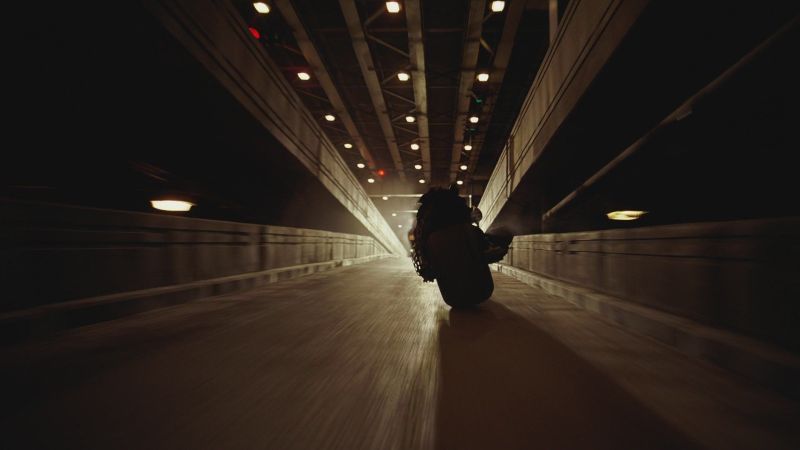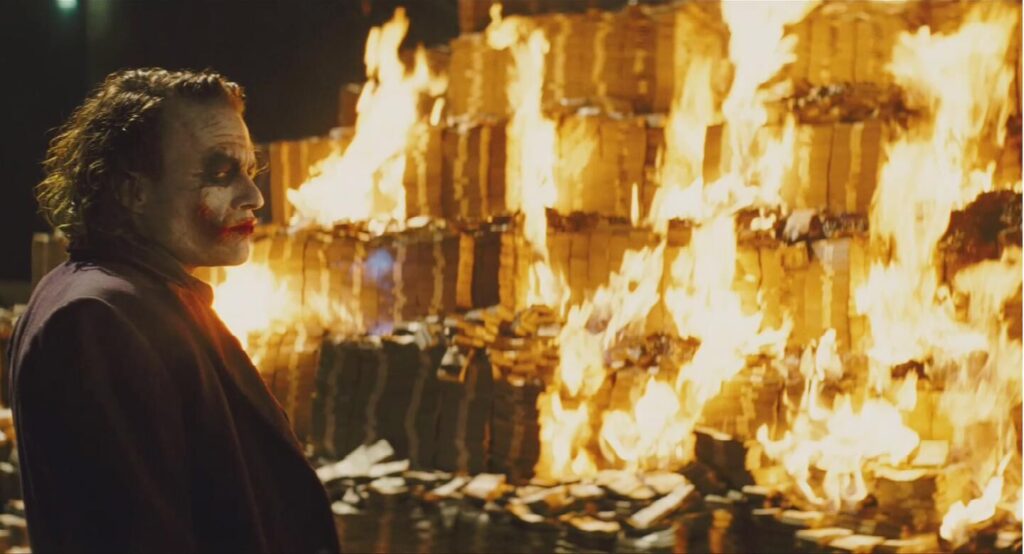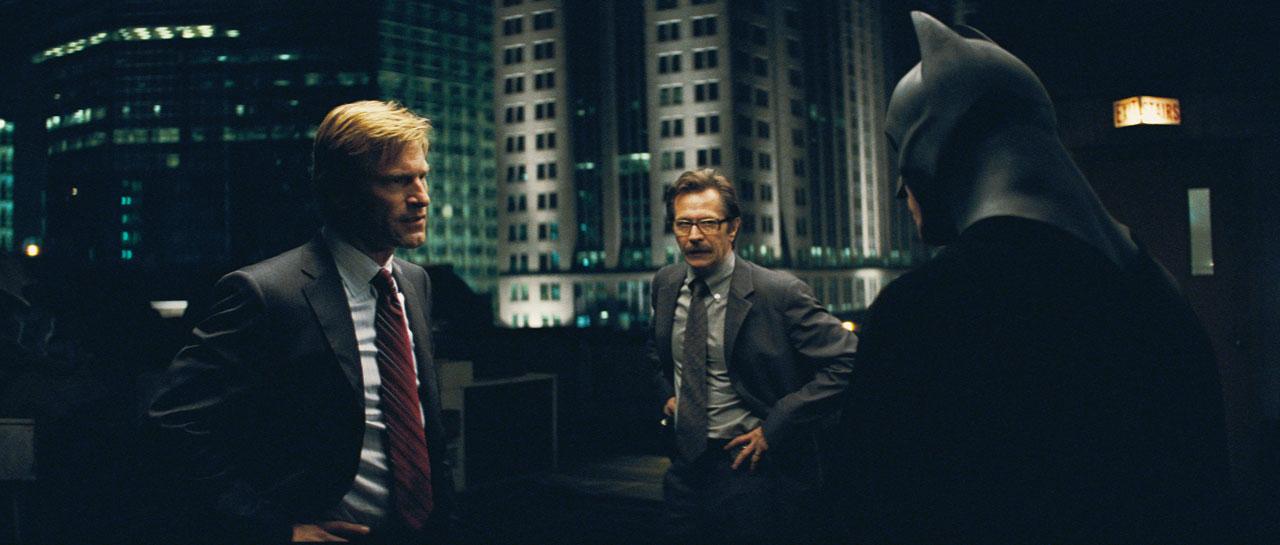There’s so much talk of how we are in a Golden Age of superhero movies, and yet it’s as if pop culture has not moved past 2008. For whatever reason, we appear to come back to a certain Christopher Nolan movie whenever some new superhero movie gains critical acclaim? If you’re active online, you’ve certainly come across those inescapable words any time a Marvel or DC release comes our way: “……….is the best comic book movie since The Dark Knight!” We saw this with Avengers in 2012; Captain America: The Winter Soldier in 2014; Captain America: Civil War in 2016; Logan in 2017; Into the Spiderverse in 2018; Endgame in 2019; The Suicide Squad in 2021; The Batman in 2022., and so on. Recency bias causes (read compels) folks to crown the new best thing as the new Dark Knight – and then the next new thing becomes the new Dark Knight, and so on. So why is The Dark Knight the gold standard we keep coming back to? Why do we want so badly for the next exciting superhero flick to be The Dark Knight of the era? To get to the bottom of this, I will cover a set of criteria for what makes a great superhero film, and how The Dark Knight checks each of my boxes in a manner that ensures it will always remain in the conversation decades later.

The first on my criteria is the thing many sing praises about The Dark Knight – the villain: There is no getting past the fact that Heath Ledger gave a towering performance as the Clown Prince of Crime, but Dave Goyer, Chris and Jonathan Nolan’s script lay the skeletal framework for this Oscar-winning performance to sprout. Ledger’s Joker is more compelling because he is an active catalyst in his story, unlike most passive supervillains that only exist as an obstacle for the hero to punch repeatedly. We don’t need to know about his scars because his real character is scarred yet he has twisted that into a smile. You see Batman telling Jim Gordon after the opening bank heist that the Joker can wait; you see mob boss Maroni scoff when he calls Joker a “two-bit wackjob who isn’t the problem”.
Every character pays the Joker no mind at the start until they regret it. Bruce may have cleaned the city, but he fails to acknowledge Joker as a symbol just like the Batman. Joker is a stronger symbol than Batman because he has no origin, he doesn’t care what the world thinks of him, he improvises better, he can operate in daylight and put himself on TV. Joker wins by tarnishing how the world sees the Batman symbol: civilians turn on Batman, cops refuse to work with him, criminals no longer fear him. Joker is the malleability to Bruce’s rigidity; the very escalation Gordon warned about. Hans Zimmer and James Newton Howard’s cello-bowed-with-razor-blades theme intended to generate alarm and discomfort in the listener’s mind whenever Joker is in a scene certainly adds to the character’s staying power. Everything the Joker represents, the way he’s written, his philosophy and the way he carries out his plan throughout the movie, is simply genius and a tough act to follow. Few superhero movies since have had the cojones to let the villain overtake the hero’s story the way The Dark Knight did.

My second criteria are worldbuilding and location: When you “begin” with Batman Begins, it’s about why and how everything in this reimagined mythos exists – the production design by trusted Nolan collaborator Nathan Crowley reflects this function-over-form approach. In The Dark Knight, things are more angular with harsher lighting to emphasize the Joker’s chaos. There is a civic “vibe” which speaks to Harvey Dent’s character as District Attorney. This is a city story now, as opposed to the Gothic theatricality of Batman Begins. Nolan uses the crime drama genre to explore different facets of Gotham society. There are more shots on the street level; more emphasis on socioeconomics. I think this was what George Lucas tried to do with his Star Wars prequels: infusing material aimed for kids with politic. This is a movie where they explain a RICO case! A MOVIE ABOUT BATMAN AND THE JOKER?! The balls to do this with a straight face! Joker and all the villains in Nolan’s trilogy wage their war on Gotham; the stakes are centered around the battle for Gotham’s soul.
This is a standout in comparison to every other superhero movie’s world ending stakes. I find that the more intimate stakes are the ones best remembered. With Nolan’s Batman, the world isn’t ending or facing some cosmic threat – yet he is still able to get to the deeper psychological question of his characters and explore their morality or lack thereof. Complain all you want about how Nolan’s Gotham is “just Chicago” but it feels like a tangible metropolis with its crumbling institutions. I remember the marketing behind this back in 2008 with all these viral campaigns that were secretly extensions of the story itself: Harvey Dent rallies, Bruce Wayne interviews, Sal Maroni on late night show, scavenger hunts, all of it to flesh out Gotham as a place that COULD exist. It’s not actual real life – Nolan calls it “cinematic reality”, where the characters and world are given as much weight and validity.

Next is genre deconstruction. It’s not uncommon to see people throwing up “deconstruction” and “subverted expectations” as some buzzword for supposed sophistication. Sure, these aren’t bad things in movies, but I feel deconstruction has become derogated by today’s social media landscape. Deconstruction and Subversions work when there’s established tropes and rules of genre that the audience relies on. So, for instance, Batman having to choose between saving the “damsel in distress” or “the white knight” is in keeping with the tradition of heroes overcoming impossible situations.
Now it’s pretty much embedded in pop culture today that Rachel Dawes dies and Harvey Dent gets scarred, but this was genuinely groundbreaking in the 2000s. I remember teenage me sitting in the IMAX theater going “Of course Bats is gonna get Rachel! Of course, Gordon is gonna get Harvey”. But he doesn’t, he loses both of them. It felt cruel, the movie didn’t feel safe, now anything could happen and we the audience had to throw away all expectations. But it’s not just a cheap “gotcha” moment – the Nolan brothers deconstruct and subvert to ask what even is a hero, and whether we can even believe in heroism anymore! Nolan didn’t allow preconceived notions of what Batman or superhero flick could be to stop him exploring vigilantism in a zeitgeist filled with fear, terrorism, paranoia, injustice, urban angst, and the overall state of the 21st century.

Next is visionary filmmaking: Surprise surprise, The Dark Knight is a perfectly crafted movie – emphasis on craft. Indeed, this entire trilogy is brimming with palpability and grit. There is no overuse of computers or kowtowing to notes by a committee. Studios today have sadly given up on building sets, hiring extras, and would rather leave it all to digital cameras and greenscreens in post-production. While every other comic book blockbuster is feeding its audience with 80s/90s nostalgia, Nolan looks to greats like Alfred Hitchcock, William Friedkin and Michael Mann to name a few.
The Dark Knight, and by extension the rest of Nolan’s filmmaking, is a rebuke of Hollywood’s fix-it-in-post cost effective business model! Nolan was not interested in making a great Batman film or great Comic Book Movie. He wanted to make a great FILM first and foremost, with Batman and his rogue’s gallery in it. It really felt like the filmmakers made the best film they could, without prioritizing a sequel they had no idea would get greenlit, unlike today’s Hollywood business model where products are written and re-written by a dozen different people. The movies themselves are virtually VFX so all the director has to do is tell he actors to say their lines, they all go home and leave it to the underpaid VFX artists to do the movie while the director takes credit.Last but definitely not least is theme: The difference between a film with something to say and a film with nothing to say ultimately boils down to theme.
Not that everything has to have a mandatory thematic resonance, but I believe it is well explored themes that holds a work of art like fine wine once the special effects and overall hype are lost in time. A key theme being tackled in The Dark Knight is identity. Why do we wear masks and pretend they are indeed ourselves? Why do we choose the masks we choose? What do we hide behind our masks, behind our faces? What mask do we choose to represent those reactions and why do we choose them? Identity is a foundational element for a subgenre about characters in costumes. The Dark Knight has banks that turn out to be mob banks; conflicting stories about Joker’s scars; copycat Batmen; secret walls that reveal hideouts; two-sided coins; firetrucks in flames; a Batpod concealed in a Tumbler; Gordon faking his death; hostages disguised as gunmen. Throughout the runtime, nothing ever seems to be what it appears at face value. The fluid nature of identity is woven into every inch of this movie.
There’s a version of who the characters are when the world isn’t looking, a version of how the world sees them, and a version of how they wish to be seen by the world. The Joker is the catalyst that peels what lies within. Bruce realizes the Bat symbol works until the world stops fearing him; Dent is revealed to be a nastier man in secret – his two-face is an unsubtle illustration of this tug of war. Ledger’s Joker felt cheated by the unfair world, so he desperately wants society to NOT make sense for everyone else. He wants to sway Gothamites to embrace his ideology, hence why he performs elaborate social experiments to tease out their ugly side. Joker’s flaw is that you cannot blame the world for the decisions you yourself made. You always have the choice to refuse a blackmail to blow up a ferry filled with criminals. When the civilians fail to detonate themselves, Joker is revealed to be a desperate man who needs the world to not make sense. In the end, the world has no identity except what we give it – we have the choice to do the right thing even if no one will never know, even if it costs you so much.

Mike’s love for films began when his dad introduced him to The Usual Suspects. From that moment on, he never looked back. Now, having explored thousands of films, he has mastered the art of unpeeling each facet gracefully. Mike especially loves writing movie reviews that are narratives in themselves, offering a unique perspective and depth you won’t find anywhere else. His insightful and captivating reviews bring each film to life, making him a standout voice in the world of cinema.

